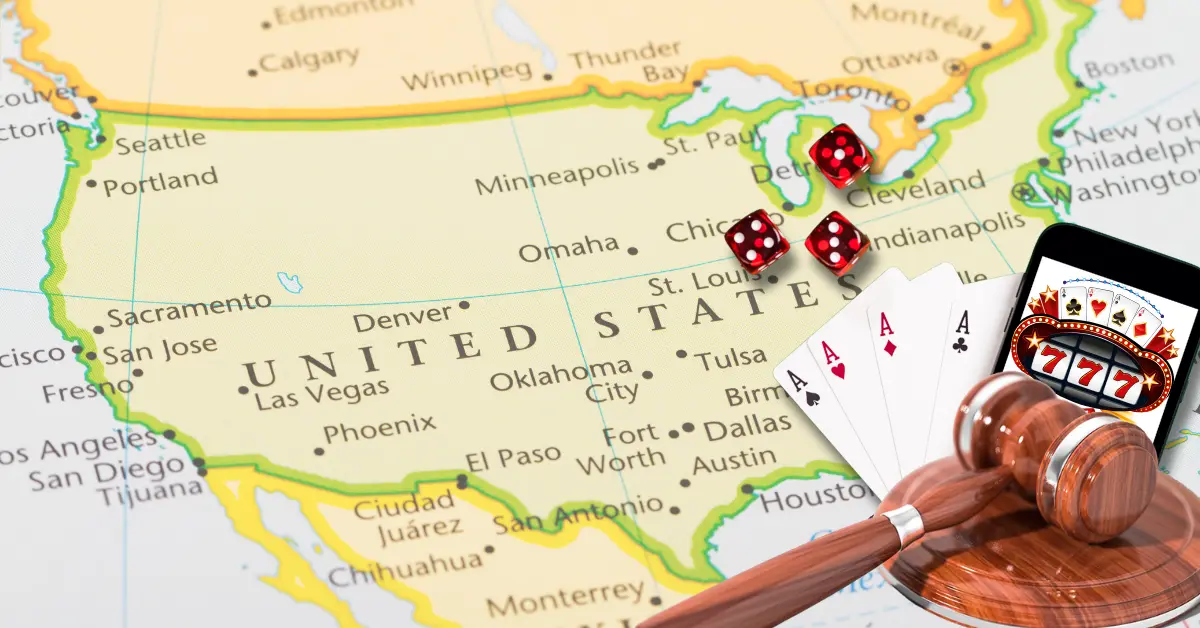Understanding the Landscape of Legal Online Gambling Across the US

Gambling has never been more accessible than it is right now. In the U.S., there are tons of casino apps, and you can’t turn on the TV or scroll social media without seeing ads. They also air during most sports games, and the number of bonus codes that pop up when you’re searching for one? Hoo, it’s a lot.
And we aren’t complaining about that! But for a lot of players, they don’t have questions about how they can play on a casino app; they aren’t sure if they’re legally allowed to.
Frankly, the legal map is a mess. There are some states that have totally legalized online casinos and sportsbooks. Then there are those who allow sports betting but not casino games. And then there are the states where it’s all banned. A handful are still undecided or in limbo, with outdated laws or lobbying battles that are holding up progress. The federal government does have a say, but it’s pretty much up to individual states to figure it out themselves.
Our guide is going to unpack where legal online gambling stands across the country, how it got there, and what it all means for the people who are trying to play in 2025!
A Brief History of Online Gambling Legislation in the U.S.
Ok, to understand the current rules, we gotta go back to the two federal laws that were enacted, as well as the court decisions that knocked things off kilter.
The Wire Act of 1961
Originally targeted at organized crime, the Wire Act of 1961 made it illegal to use wire communication for “bets or wagers.” Since then, regulators and judges have interpreted that to include online gambling, even when the law itself had zero mention of the internet.
The Unlawful Internet Gambling Enforcement Act (UIGEA) of 2006
In 2006, rather than outright banning all online gambling, UIGEA concentrated on stopping financial institutions from processing transactions with offshore gambling sites and casino apps. In practice? This meant no credit cards could be used for betting. And if your money couldn’t get through, neither could your bet.
The Impact of Landmark Decisions
Two court decisions changed the playing field. There was one that narrowed law interpretation and another that consolidated felt altered states’ power.
2011 DOJ reinterpretation of the Wire Act
A u-turn was made in 2011; the Department of Justice clarified in 2011 that the Wire Act applied only to sports betting, and not to casino or poker games. That reopened the door for states to legalize intrastate online gambling.
2018 Supreme Court ruling on PASPA
And in May 2018, the U.S. Supreme Court struck down PASPA, which was the federal law that had effectively prevented states from even offering sports betting. That decision handed the authority back to the states, and they moved at warp speed to launch casino apps and sites!
States Where Online Gambling Is Legal
Currently, only seven states allow the whole package; that means online casinos, poker, and sports betting are all legal and under state regulation. If you live in one of these, you’re playing with house rules that are clear, state-approved, and come with consumer protections like deposit limits and verified payouts.
That’s not only a policy win; it’s a huge market. In 2024, New Jersey alone brought in over $2 billion in online casino revenue, and Pennsylvania and Michigan were close seconds. The demand is there, and these three states got ahead of it.
Fully Legal States: Online Casinos, Sportsbooks, and Poker
Below are the seven states that have fully legal online gambling:
- New Jersey: The first mover. Legal since 2013, NJ is the model for other states. There are over 30 legal gambling apps and sites, so the competition is fierce, and that benefits players with bigger welcome bonuses and better odds.
- Pennsylvania: Launched in 2019. PA has turned into a heavyweight and regularly pulls in over $200 million a month from iGaming. It’s also one of the few states to tax online slots and table games separately.
- Michigan: Fully live since 2021. Michigan’s approach was really smart! They have both commercial and tribal operators’ licenses, which give them broad reach and political support.
- West Virginia: WV is one of the best markets for poker players. Despite a smaller population, the state legalized all three verticals (casino, poker, sports), and that paved the way for interstate poker compacts.

- Delaware: Small but still historic. Delaware was one of the first states to offer legal online casino gaming, and while its market is limited, it’s still an important player due to its early adoption and partnership with 888 Holdings.
- Connecticut: Live since 2021, it only has two operators (DraftKings and FanDuel) through tribal compacts. It’s streamlined, but also limited in choice.
- Rhode Island: The newest member of the club. As of 2024, Rhode Island offers legal online casino play, with Bally’s as the exclusive provider.
Types of Gambling Allowed by State
Below is a quick look at which types of legal online gambling is available in each of these seven states:
| State | Casino | Poker | Sports Betting |
|---|---|---|---|
New Jersey | ✅ | ✅ | ✅ |
Pennsylvania | ✅ | ✅ | ✅ |
Michigan | ✅ | ✅ | ✅ |
West Virginia | ✅ | ✅ | ✅ |
Delaware | ✅ | ✅ | ✅ |
Connecticut | ✅ | ✅ | ✅ |
Rhode Island | ✅ | ✅ | ✅ |
States with Legal Online Sports Betting Only
Not every state that legalized online betting went all the way. A large group has approved online sportsbooks but kept digital casinos and poker rooms off-limits as of now. The reasons vary; some see sports betting as a lower-risk activity, and others are moving with caution, one vertical at a time.
As of early 2025, around 30 states and Washington, D.C. allow legal online sports betting. These include major markets like New York, Illinois, Colorado, Arizona, and Tennessee. In most of these states, you can legally bet on pro leagues, college matchups, and international events via mobile casino apps, as long as you’re physically located within state borders.
What you won’t find in these jurisdictions are licensed online casinos or poker rooms. So if you are itching to play blackjack or Texas Hold ’Em for real money, you’ll have to either travel to do so or wait for the legislation to expand.
Notable Restrictions or Requirements
The Devil is in the details when it comes to access. The following are some of the most common limits and safeguards that are used in sports-only states:
- In-Person Registration: Some states first required players to create their online sportsbook accounts in person at a brick-and-mortar casino. Illinois had this in place until early 2022, and Iowa required it until 2021. A lot of states have since dropped this rule, but a few still flirt with the idea as a way to keep betting somewhat grounded in physical locations.
- Age Minimums: The standard legal age to place sports bets online is 21. A handful of states, like Montana or New Hampshire, allow it at 18, but it’s only when no retail casino partner is involved.
- Geolocation Technology: All licensed sportsbooks use geofencing tools to guarantee that you’re inside the legal zone. The tools run in the background and lock you out if your phone pings even a foot over a state line. If you’ve ever driven into a border town and seen your casino app freeze? This is why!
States Where Online Gambling Is Still Illegal or Limited
Despite the industry’s growth and widespread adoption, not all states are on board. A few are still firmly opposed to online gambling in any form, albeit casino games, sports betting, or lottery tickets.
These states tend to either have long-standing bans on most forms of gambling or they have chosen not to address the issue so far. That means no legal options, no licensed operators, and no protections if something goes sideways.
1- Outright Bans
There are states that don’t only restrict gambling; they’ve made it crystal clear that they want no part of it. They are the states listed below:
- Utah: Gambling is banned under state law and the state constitution. Utah takes a zero-tolerance stance. Even social casino apps can raise red flags depending on how they’re monetized.
- Hawaii: There are no casinos, no racetracks, and no state lottery. Gambling opponents in Hawaii cite concerns about addiction, tourism impact, and community harm.
- Idaho: While it’s technically not banned in the constitution like Utah, the state has refused to authorize any form of online gambling. Online sportsbooks are not legal, and daily fantasy sports are in murky territory.
2- Heavily Restricted or Stalled
Some other states haven’t banned online gambling explicitly, but haven’t made progress toward legalizing it either.
- Texas: There is really strong opposition from religious groups and influential legislators, so Texas has resisted efforts to legalize online betting. Multiple bills have failed in recent congressional sessions.
- Alabama, Alaska, and Nebraska: These states have either strict limitations or a minimal legal framework. There have been some discussions around expansion surface occasionally, but no substantial movement has happened.
In these places, players have used offshore sites. But without any local oversight? There is no recourse if a platform refuses to pay out or misuses your info.
3- Ambiguous or Gray Areas
Then there are the “in-between” states. These are the places where the law hasn’t caught up with the technology, or where proposals are stuck in legislative purgatory. The states don’t have explicit bans, but they also don’t offer clear support or licensing for legal online gambling.
The result? Confusion for players, hesitation from operators, and a waiting game that keeps dragging out.
Pending or Undefined
Below are the states that have ongoing debates or legislation on the table in regards to gambling:
- Missouri: Sports betting bills have been introduced almost every year since PASPA was struck down. But pushback from casino lobbyists and disputes over slot-like machines in gas stations continue to hinder progress.
- South Carolina: A few lawmakers have voiced support for sports betting in recent years, but efforts have failed to gain any momentum. The state’s gambling laws are vague, and the political appetite to modernize them is minimal.
- Ohio (prior to launch): Until January 2023, Ohio was in this gray zone. Lawmakers had passed a bill in 2021, but operational rules weren’t finalized for over a year. That delay kept legal apps in the gray zone despite having public support.
What Makes These States Unique
In gray-area states, there’s usually disagreement over who should regulate online gambling: lottery boards, gaming commissions, or entirely new agencies. Tribal interests, commercial casinos, and religious organizations all hold sway and pull in opposite directions.
In some cases, the delay is purely bureaucratic. In others, it’s political hesitation. Either way, these are the states to watch. Because once legislation does move, markets can open practically overnight.
Main Factors Affecting State Decisions
Why has legal online gambling taken off in some places but stalled or been blocked in others? It usually comes down to a mix of economics, politics, and infrastructure. No two states have identical roadblocks or incentives. Some are chasing tax dollars. Others are negotiating long-standing deals with tribal casinos. A few just don’t have the digital or political bandwidth to move forward.
Below, we look at the most common reasons a state says yes or no to online gambling!
States with tight budgets or declining tax bases look at online gambling as a financial fix, or at least a boost. In Michigan, online gaming generated over $1.9 billion in gross revenue in 2024, a portion of which directly supported schools and city programs. New Jersey, Pennsylvania, and Illinois also rake in tens of millions per month in taxes from digital gaming. For most legislatures, that kind of cash flow is really hard to ignore, especially when it’s paired with job creation from tech partnerships and operator offices.
In states like California, Arizona, and New Mexico, tribal gaming compacts create a lot of legal complications. Most tribes operate casinos under exclusive deals with the state, and that can limit or delay online expansion, especially if new legislation might cut into in-person revenue. Some tribes, like those in Michigan and Connecticut, have found a way to participate in online markets directly. Others have pushed back, as they are concerned about sovereignty or unfair competition.
There’s no way around it: online gambling is still a cultural flashpoint in some regions. Religious coalitions, anti-gambling groups, and some voter bases remain opposed. In states like Texas and Georgia, that opposition has been enough to derail or stall legislation, even though the polling shows growing public support.
And in places like Colorado and Indiana, more moderate or libertarian-leaning lawmakers have viewed online gambling as an individual liberty, and then passed legislation accordingly.
Legalizing gambling is one thing. Regulating it? That’s a whole other can of worms. States need the tech to support ID verification, geolocation, secure payment processing, fraud monitoring, and addiction safeguards. The states with limited gaming experience (e.g., Alaska or Nebraska) aren’t prepared to build or staff those systems. Others already have lottery or casino frameworks, which means they can expand on those and make it happen.
What Players Need to Know
If you’re a casual player or someone who is serious about finding an advantage, legality always matters! Knowing the rules can save you money, protect your data, and help you avoid sketchy platforms. Here’s how to check where things stand and what to watch out for if you’re betting online.
How to Check If It’s Legal Where You Live
Don’t rely on ads, influencers, or friends who “heard it was fine.” If you’re not sure if gambling is allowed in your state? Do the following!
- Visit your state’s official gaming or lottery commission site. That’s where licenses, regulatory updates, and approved operator lists live.
- Look for a consumer protection or “authorized sites” section. All states post these publicly.
- If the casino app or site you’re using doesn’t appear on an official state list, it’s not licensed, and it’s not safe.
Why You Should Never Use Offshore or Unlicensed Sites
Offshore gambling platforms might look like they’re legit, offer massive bonuses, and let you bypass certain restrictions, but they all come with huge risks. None of them are subject to U.S. consumer protection laws, and if something goes wrong? Like delayed payments, frozen funds, or odds manipulation? You have no legal recourse.
There’s also the legal risk: in some states, using offshore sites is a violation of local or federal law. The crackdown has already begun in places like New York and Illinois; regulators have started to flag VPN use and bank transfers that are linked to unlicensed operators.
Look for Responsible Gambling Features
Licensed platforms are required to provide tools to help players manage their betting habits. That includes the following:
- Deposit limits
- Spending alerts
- Session time reminders
- Cool-down periods or “self-suspension”
- Full self-exclusion (both on the platform and statewide)
Studies have shown that players who actively set limits are less likely to experience problem gambling symptoms. If the site you’re on doesn’t offer any of this? That’s your signal to leave!
The Future of Online Gambling Legislation
Online gambling laws are still in motion. Even in the states that have legalized some form of it, the rules are always evolving; more verticals are being added, more operators are being approved, and more pressure is building on the states that haven’t moved yet.
What’s coming down the pike?
State Expansion Will Continue
Expect to see at least a half dozen new states move toward legalizing some form of online gambling in the next two to three years. Legislators are watching neighbors rake in millions in tax revenue, and voters are warming up to the idea of gambling funds being used for schools, roads, or public safety.
Watch for holdout states like North Carolina, Georgia, and Missouri to take serious steps toward mobile sports betting and possibly online casino legislation before 2027.
Interstate Compacts Are Growing
While most online casino laws are written for intrastate play, a handful of states have signed deals to pool poker liquidity across borders. Michigan, Nevada, New Jersey, and Delaware are already doing this for online poker, and more will follow.
Expect discussions around shared online casino markets to emerge soon. Yes, it’s complicated, but they offer obvious upside for smaller states that have limited player pools.
Federal Involvement Could Resurface
For now, states mostly have the control. But that could change. There’s been talk in Congress about setting national standards for advertising, consumer protections, and financial disclosures.
This wouldn’t necessarily replace state rules, but it could impose a baseline. Federal regulations would be able to mandate how sportsbooks verify age or disclose house edge, even if those platforms are already licensed by the state.
So far, the above efforts haven’t gained much ground. But if more consumer issues surface? That could change.
Conclusion
The U.S. online gambling landscape is so far away from being unified that it’s almost laughable. Only seven states have a full suite of digital gambling options, and dozens are working through different stages of legalization, hesitation, or outright prohibition. Federal law makes the borders, but the real decisions are happening in statehouses, but are they happening fast enough for players?
It doesn’t matter if you’re a bettor looking for a legal sportsbook, a policymaker who is trying to understand what works (or doesn’t), or a business that’s eyeing expansion; staying updated isn’t an optional thing. The legal terrain is changing, and every year comes with new legislation, new court rulings, and new technologies that change how gambling works in practice.
Look below for a recap of the legal diversity of online gambling across states:
- Full-service states (casino, poker, and sports): NJ, PA, MI, WV, DE, CT, RI
- Sports-only states (as of 2025): ~30, including NY, CO, AZ, IL, TN
- Illegal or no access: UT, HI, ID, TX, AL, NE
- Gray areas or pending: MO, SC, others with active bills or legal ambiguity
To stay on the right side of the law and avoid scams, always check your local rules, read the fine print, and only play on legit and verified platforms. If your state isn’t legal yet, try to be patient. The odds of it changing are growing!
No matter where you are, don’t forget always to practice responsible gambling. And make sure that it’s legal!


